The Book Cellar: A Pillar in Lincoln Square for Almost Two Decades
Thursday, April 27, 2023
[June 12, 2004—Present]
Owner: Suzy Takacs
Location: 4736 N. Lincoln Avenue
Neighborhood: Lincoln Square
Independent Bookstore Day Specials: Booksellers tote bags for sale; big balloon photo op; drawings for discounts; free popcorn.
by Donald G. Evans
Books and wine. A simple enough concept, but nobody else had done it, was doing it. Suzy Takacs opened The Book Cellar on June 12, 2004. She’d been a women’s health care nurse practitioner the past nine years. Her minimal retail experience dated back to high school in her hometown of Joliet, part-time jobs at the Weber Dairy ice cream shop and Sycamore women’s clothing store.
“I was an avid reader,” Suzy told me. “There are a lot of bookstores in Chicago now, but then there wasn’t one on the Northwest Side. Books and wine were my two favorite things; I wanted to do them together.”
The allure of independent businesses, especially here in Chicago, and especially of the book variety, is that the owners rate their own passion over sanity. Suzy knew going in that owning a bookstore was unlikely to make her rich. Indeed, the grim economic realities mostly explained why so few bookstores went into and stayed in business. But then-Alderman Gene Schulter said his 47th Ward neighborhood had been requesting a book shop. Suzy decided it was time for her to make a huge life change, one that would equally impact the Lincoln Square neighborhood.
“I remember when she built it, it gave us a gathering place in the neighborhood that wasn’t a dive bar or mediocre restaurant,” said loyal customer and bestselling author James Finn Garner, who has lived in Lincoln Square almost 32 years now. “That was a great feeling. For a small store, it’s a real important part of the whole neighborhood. Once we had a bookstore, Lincoln Square became complete.”
The Book Cellar entered Lincoln Avenue as a new construction. It was what realtors call a “vanilla box,” meaning a ground up construction. Suzy oversaw the entire 2,400-square-feet build out. The store’s address, at 4736 N. Lincoln Avenue, is in the heart of a district only minimally open to traffic. It’s a quaint stretch of paver stones that extends from Lawrence to Leland Avenues, a limited number of angled parking places on the east side of The Square, with a majestic fountain as its centerpiece. People use The Square’s ornate wrought iron and wood benches to eat a meal, check their phones, or watch the day go by. Despite the inherent charm of the retail district, a lot of stores along there have come and gone over the past two decades, a dynamic that was true even before The Book Cellar joined the fray.
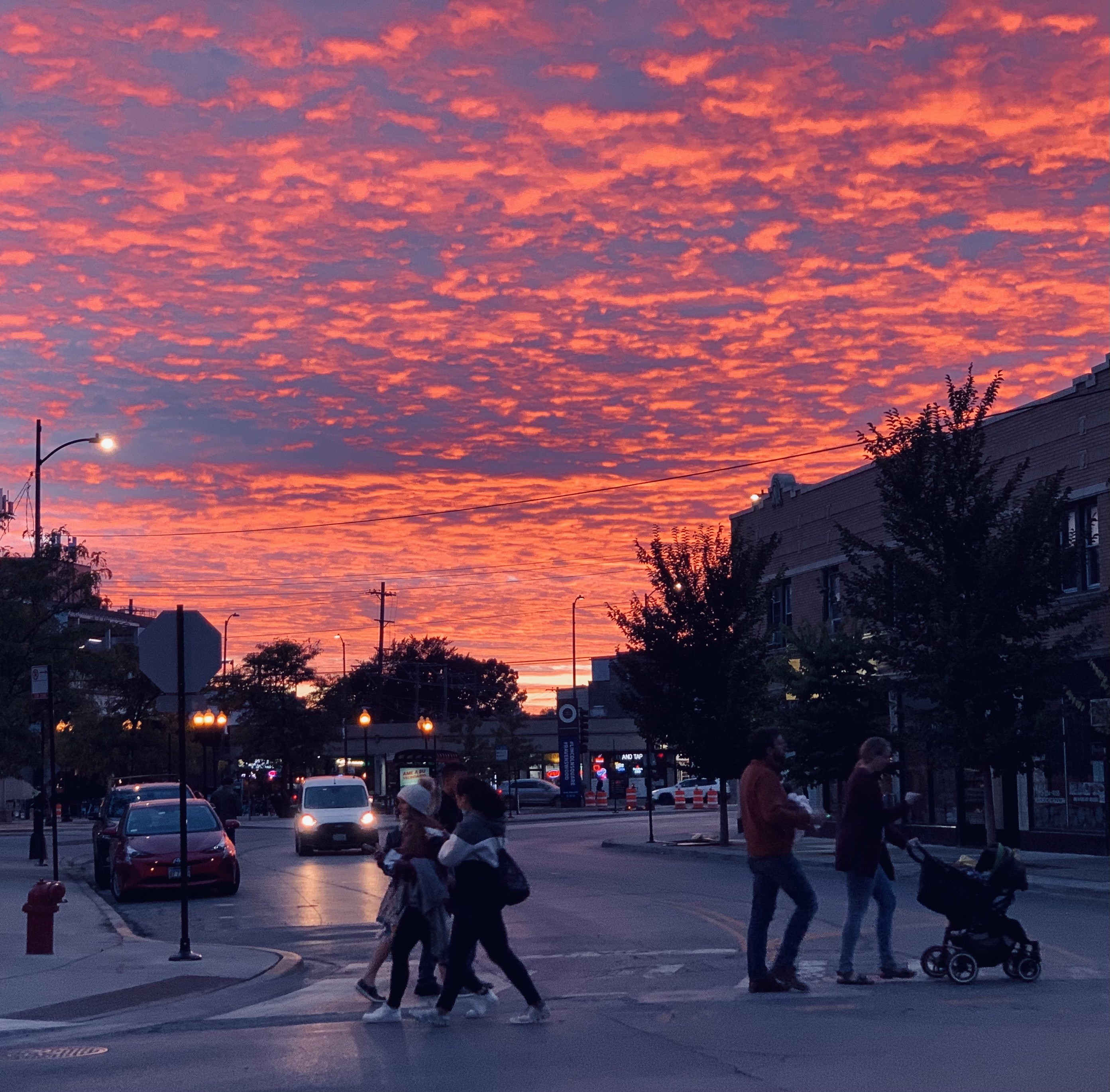
“We had a soft opening, we didn’t do anything special,” said Suzy. “I was nervous. I wanted to make sure we could do everything.”
Now, almost two decades later, Suzy employs ten workers, about half on a full-time basis. She works persistently, seeing to everything that needs seeing to, including payroll, event planning, scheduling, curating, even ringing up a coffee or book sale. Suzy lives in Lakeview, but like her employees shuttles back and forth to Lincoln Square so regularly that it’s more home to her than home.
It’s a well-curated bookstore, heavy on local authors and children’s titles, as well as bestsellers, new releases, classics, and critically acclaimed literature. An eclectic mix of blown-up book jackets adorn the south wall. A small menu of wine and beer, as well as coffee and cold drinks, are available for purchase. Suzy selects varietals she enjoys and which are familiar, though she always includes an “Easter egg” or two, unique labels her customers might discover through her store. Before the pandemic, there were six tables at which customers would eat, drink, write, study, read, or enjoy conversations. Several cushioned lounge chairs were scattered around the store, especially near the front window, but also hidden amongst the shelves. That changed when the store went into shutdown mode, but is slowly getting back to normal.
“We’re all booksellers,” said Kelci Dean, who joined The Book Cellar staff in March 2021. “We all kind of know how to do everything. Because we’re a small business, we have to, just in case.” Kelci’s job includes processing orders, customer service, ordering books, emailing authors and publisher representatives, web fulfillment, unpacking books, and more.
When Kelci applied for a position at the Book Cellar, Suzy conducted an initial interview, then turned her application over to the staff. It’s a process that Kelci has come to know well now that she is a two-year veteran at the store.
“The staff has a lot of input into hires,” said Kelci. “It’s a lengthy process. After you talk to Suzy, the staff, whoever’s on shift at the time, interview you one at a time.”
Suzy’s hiring process highlights the difference between a big box bookstore and a small indie shop. Strong allegiances amongst staff, customers, and neighboring businesses form the core of The Book Cellar’s charm and success. Everybody cares about literature and everybody cares about each other. It’s one of the reasons Suzy insists that staff help choose staff: their love of books, each other, and the store takes precedence over all else.
“After almost twenty years, a lot of the customers are my friends, or at least are familiar to me,” said Suzy. “And the employees, and the people I’d met along the way. I spend a lot of time here. My sales reps, a lot of them, are my friends now. I really enjoy my employees. The business owners in the neighborhood are all pretty cohesive.”
This sense of community, this spirit of togetherness, is difficult to find in a big city like Chicago. It does not happen organically, unless there is a hub or a gathering spot to encourage relationships. Corner taverns were often that place for a certain segment of the population; clubs or restaurants, for others. But book lovers are their own breed and the community they seek does not necessarily show up in those other places.
This inbreeding between owner, staff, customers, neighbors, and fellow business owners might be considered a violation of corporate or institutional codes. But The Book Cellar thrives on these relationships. The store is there for the people and the people are there for the store.
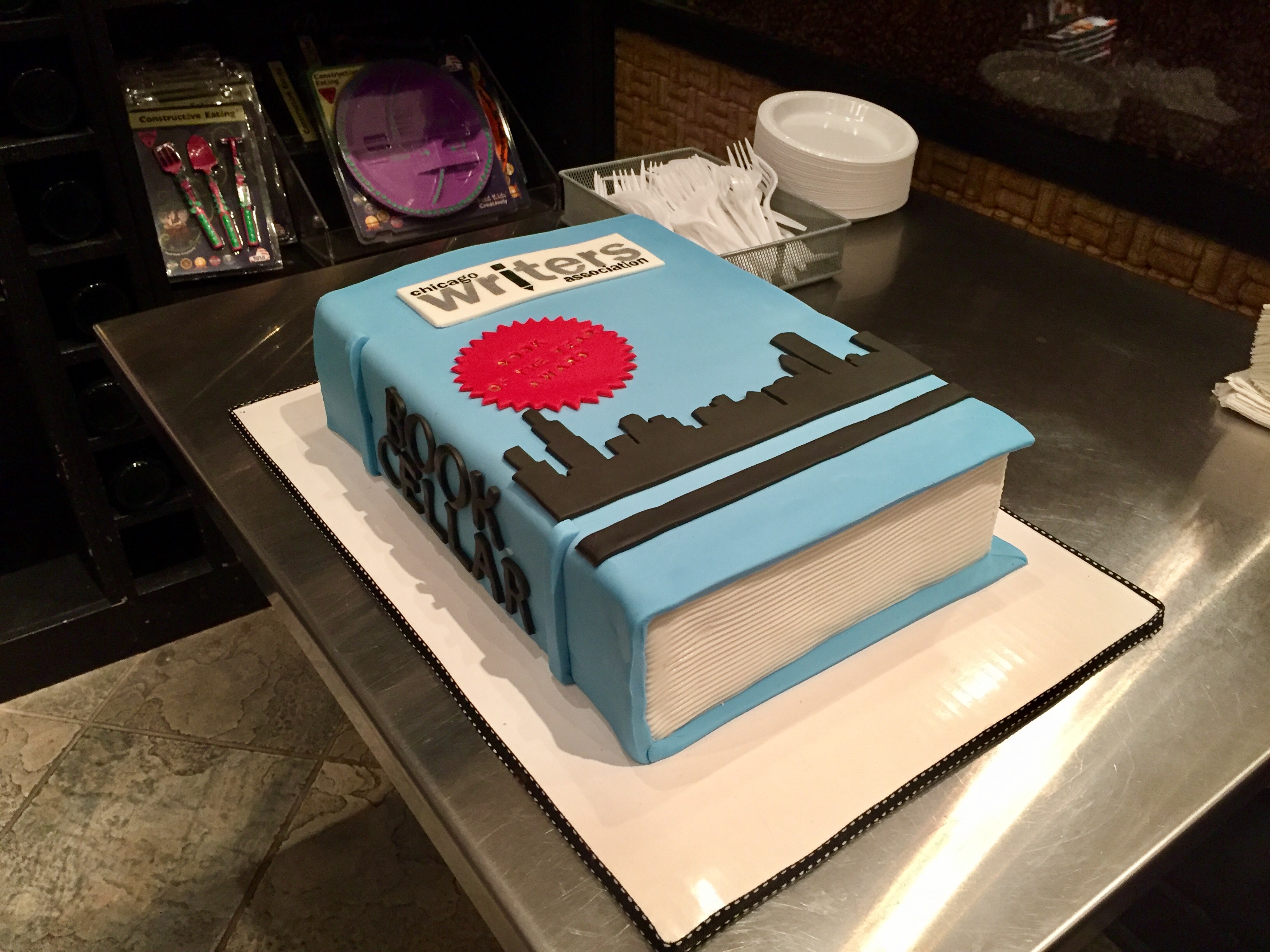
For the past 11 years, since 2011, the Book Cellar hosted the Chicago Writers Association’s Book of the Year Awards. As part of the ceremonies, dozens of notable authors, including Christine Sneed, Ethan Michaeli, Mary Wisniewski, Samantha Irby, Elizabeth Wetmore, Renee James, Martin Seay, Tiffany Gholar, and Peter Ferry, took the tiny, makeshift, Book Cellar stage. For the inaugural ceremony, Suzy and The Book Cellar surprised CWA with a large sheet cake topped with an airbrushed image of a book.
“It sort of helped establish our award and gave it a certain level of prestige that it might not otherwise have, because this respected bookstore was supporting us,” said author, lawyer, and CWA president Randy Richardson. “It’s more than just a local independent bookstore, it’s part of the community. Every time we had a ceremony, it just felt right. Suzy’s done so much to support local authors. We’d go in there, freezing cold, a snowstorm outside, and we’d pack 80 people into this tiny bookstore. It felt warm and welcoming.”
CWA gave Suzy its Spirit Award as an acknowledgement of her fine work on behalf of the larger community and its own organization. “She helped us to grow into what we became over the years,” said Randy.
Suzy’s been singled out for other awards, as well, making Newcity’s Lit 50: Who Really Books in Chicago list so habitually that she got moved to the Hall of Fame category. The Book Cellar’s reputation as a welcoming place—for everybody, but especially nearby residents—has much to do with the store’s success. CWA’s story is a common one.
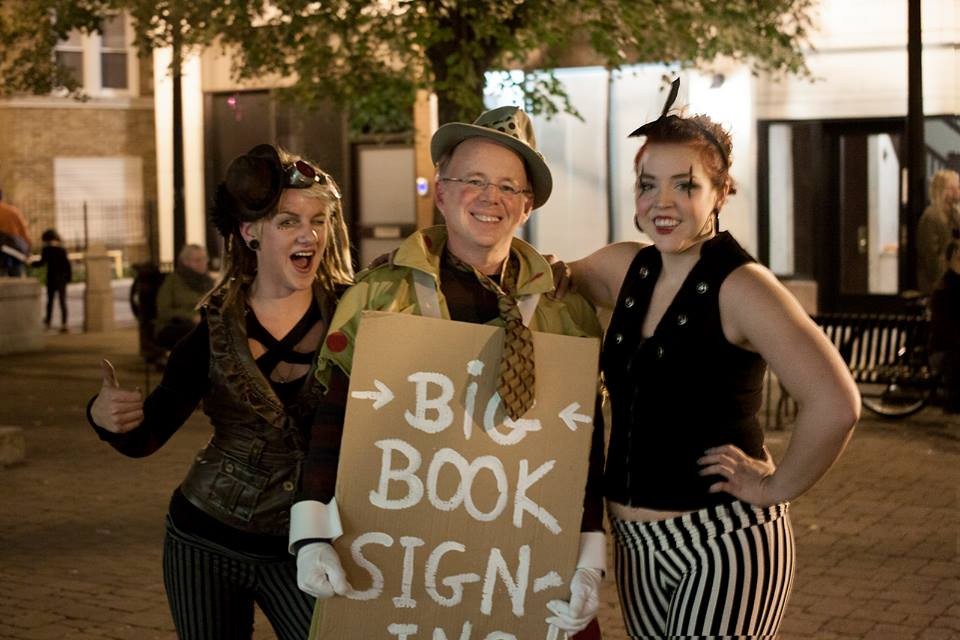 When Jim self-published The Wet Nose of Danger, the third installment of his Rex Koko: Clown Detective series, he wanted a launch that captured the spectacle of the period circus settings. He jokingly approached Suzy to ask if they could have a fire eater in the store. “We’re surrounded by books and paper and cardboard, but Suzy didn’t think I was kidding. She thought and thought and finally said, ‘I would, but there are people living upstairs.’ ”
When Jim self-published The Wet Nose of Danger, the third installment of his Rex Koko: Clown Detective series, he wanted a launch that captured the spectacle of the period circus settings. He jokingly approached Suzy to ask if they could have a fire eater in the store. “We’re surrounded by books and paper and cardboard, but Suzy didn’t think I was kidding. She thought and thought and finally said, ‘I would, but there are people living upstairs.’ ”
That anecdote illustrates Suzy’s inherent kindness, but also that she is game for just about anything. Jim did partner with The Book Cellar on his 2013 book launch, but moved the pomp and circumstance to the plaza across the street. The fire eaters, indeed, performed, along with several Old Town School of Folk musicians. That launch featured a circus lingo trivia contest, with the winners receiving a popcorn ball “thrown personally by Rex Koko.”
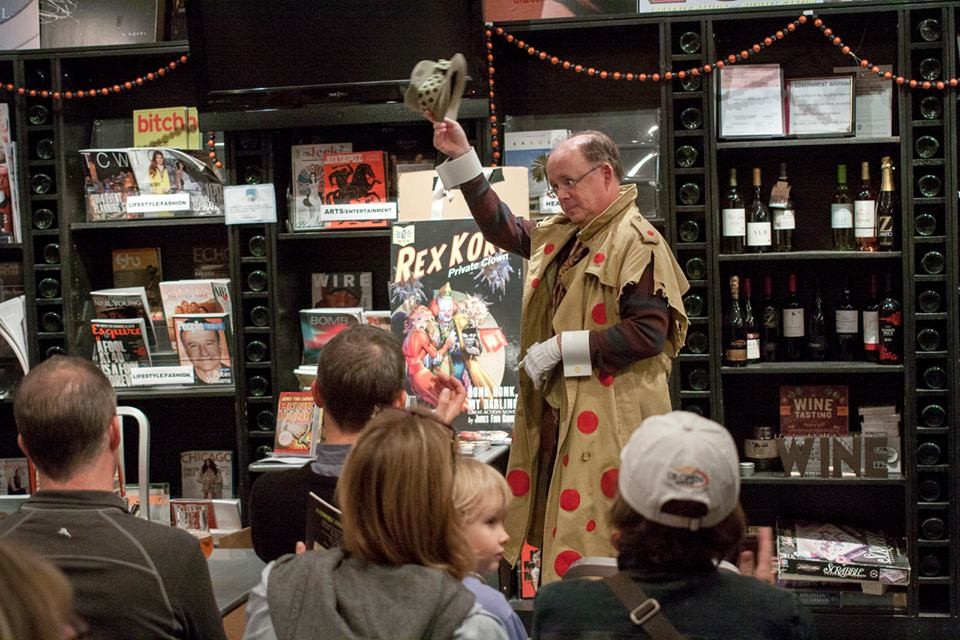
At other times, Jim has participated in a Men’s Night reading with Brian Guley and Jonathan Eig (2010), and Essay Fiesta, a live lit series that took place every third Monday until the pandemic shut it down. Essay Fiesta counts as one of many regular programs that have taken place at The Book Cellar. StoryStudio Chicago regularly (again, pre-pandemic) hosts their Student and Instructor Reading, a chance for writers, especially from the Novel-in-a-Year program, to showcase their work alongside that of their more accomplished teachers. There are, too, a bevy of regular in-store programs, such as The Book Cellar Book Club (first Wednesday of every month), Never Too Old (a YA book group), Afterwards, an Old St. Pat’s book group, and Salon (focused on classics).
“I’m about six blocks from The Square,” said Jim. “Suzy is very supportive of the locals.”
Among the local authors that frequent the store, both on the little stage and off, are illustrator Jeffrey Brown, James Kennedy, Renee Rosen, and Wade Rouse. Veronica Roth shops at the store, as does Kathleen Rooney, Peter Sagal, Stacey Ballis, Julia Fine, Jeff Tweedy, and Lindsay Currie. Rachel Swearingen is another local author and dedicated customer.
Rachel lived in Minneapolis until she and husband John moved to Chicago almost eight years ago. Rachel long wanted a bookstore within walking distance, so The Book Cellar factored into their apartment and ensuing house hunt equation. “Having The Book Cellar right on The Square was a major selling point,” said Rachel. “I live just a few blocks away. I really feel the sense of community there. You can order books online and they usually come in within a few days. Suzy sets them in the vestibule, ready for you to pick up. It’s as convenient as Amazon if you live nearby.”
Rachel’s debut publication, the short story collection How to Walk on Water, came out in October of 2020, when live appearances were impossible. Book sellers were still trying to figure out how to pivot.
“Suzy agreed to do the book launch,” said Rachel. “She had to learn really quickly how to put everything online. There’s something to be said about being able to participate in a local literary community. You’re sharing what you’ve been working on and getting ideas. Having a physical space to enter into those exchanges is really important.”
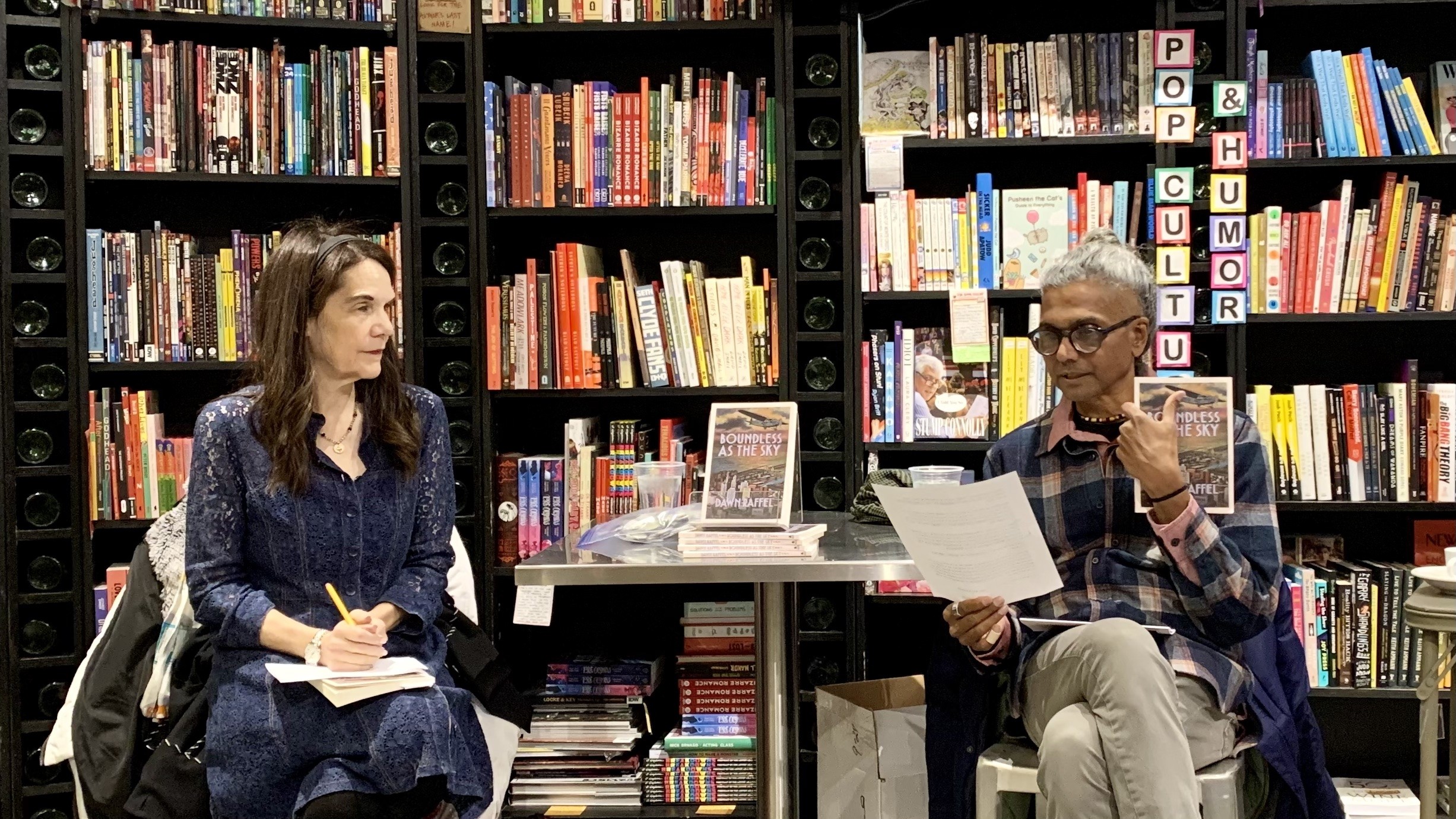 Rachel points out that The Book Cellar’s support extends to small press authors, many who read there, even though it’s tough to draw audiences and the publishers often don’t allow returns, as the larger entities do. For another reading at the store, Rachel and an out-of-town author drew a sparse audience. Despite that, Suzy and the store remained fully supportive and went out of their way to dissuade the authors from feeling the event was a failure. Rachel’s publisher, New American Press, and others like it, need advocates to overcome inherent disadvantages in the marketplace.
Rachel points out that The Book Cellar’s support extends to small press authors, many who read there, even though it’s tough to draw audiences and the publishers often don’t allow returns, as the larger entities do. For another reading at the store, Rachel and an out-of-town author drew a sparse audience. Despite that, Suzy and the store remained fully supportive and went out of their way to dissuade the authors from feeling the event was a failure. Rachel’s publisher, New American Press, and others like it, need advocates to overcome inherent disadvantages in the marketplace.
“The Book Cellar has long been a central part of Lincoln Square,” said devoted customer, Judy Raddue. “Not just because of books, but a gathering place for events and, most importantly, Suzy’s dedication to small businesses.” Judy, who describes herself as a wine lover and lifelong bibliophile, has lived in Lincoln Square just short of two decades. She’s been a customer since almost the day the store opened and a member of the store’s book club these past 17 years.
Other stores, like Timeless Toys, Café Selmarie, The Huettenbar (now Lincoln Square Taproom), and Jerry’s Sandwiches collaborate on Square-wide events, like the Lincoln Square-Ravenswood Chamber of Commerce’s Halloween Happenings, Wine Stroll (in spring and fall), and Apple Fest. Many of the stores play along with The Book Cellar’s “Where’s Waldo?” summer program, with cardboard cutout Waldos hidden up and down The Square. The businesses even offer discounts to neighboring employees.
“Lincoln Square is not my neighborhood--it’s my village,” said Judy. “Living here, it’s easy to forget that I live in the third largest city in the U.S. It feels more like a small town--one where I know my neighbors, have developed friendships with small business owners, and where just about everything I need is within a 15-minute walk from home. After all these years, The Book Cellar has become a home away from home.”
Judy’s favorite memories include the time Rebecca Makkai came to the book club after the group had read The Great Believers, and when punk icon Richard Hell shared that he’d caught a movie at the Davis before his book event there. She also appreciates the store recommendations.
A bookstore’s reputation relies, in large part, on its knowledge. It’s difficult to bluff serious readers; generic endorsements are at best unhelpful and at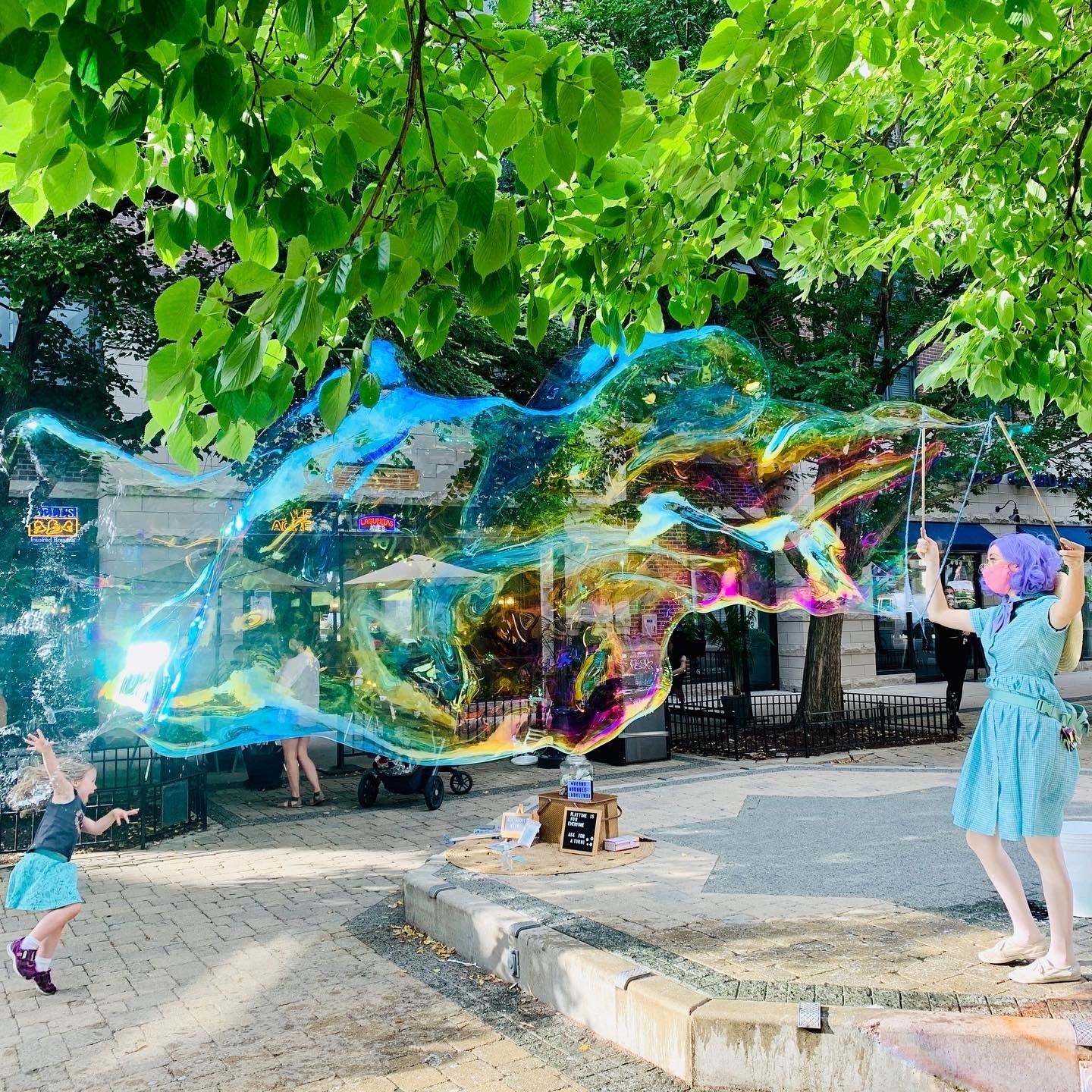 worse insulting. The store—meaning all the people that staff it—must do the reading. Furthermore, they must be articulate and passionate in the way they talk about books.
worse insulting. The store—meaning all the people that staff it—must do the reading. Furthermore, they must be articulate and passionate in the way they talk about books.
“Being around books and the book community, you just naturally become more of a reader and become better at reading,” said Kelci. “We all like to read and have book clubs outside of work. We all stay involved in the liberal arts community in Chicago—comedy, music theatre. It’s a well-rounded group.”
There isn’t much time to read at work, but The Book Cellar staff, as well as Suzy, habitually do so off the clock. Often, the reading is in advance of an author appearance or a big publication, but also just to investigate a title of personal interest. The books that impress the staff turn into store suggestions. Staff members take the time to write up brief recommendations called “shelf talkers” to attach to special books, and readily share their enthusiasm with in-store customers. Suzy makes it her job to finish one or two advanced reading copies from each of the 18 publishing representatives she sees on a quarterly basis.
The Book Cellar’s top sellers, such as Eric Larson’s Devil in the White City and Lori Rader-Day’s detective novels, do not necessarily sync with The New York Times or even other local book shops.
“We make a lot of personal relationships with customers,” said Kelci. “We try our best to read local authors, to read across genres, to better recommend things to all age groups. We’re enthusiastic about what we read and follow up with customers. There’s a personal thing to it that you cannot get from online book shopping. Book sellers help people find books.”
Rachel said that even The Book Cellar customers rate as a reliable source of inside information.
“I’ve been sold books by other readers,” said Rachel. “At The Book Cellar, because it’s so full of books and you’re standing right next to each other, somebody will pick up a book and say, ‘You’ve got to read this.’ I’m reading a science fiction book, by Okorafor Nnedi, that I would never have bought if it hadn’t been for another customer.”
Nineteen years is a long runway to make memories and also run into trouble. For every great Harry Potter launch party, there is a problem to solve; for every David Sedaris reading, there is a worry. One day strollers line Lincoln Avenue as Storybook Mom Nili Yellin delights a young crowd; the next day, a burglar crowbars the back entrance door.
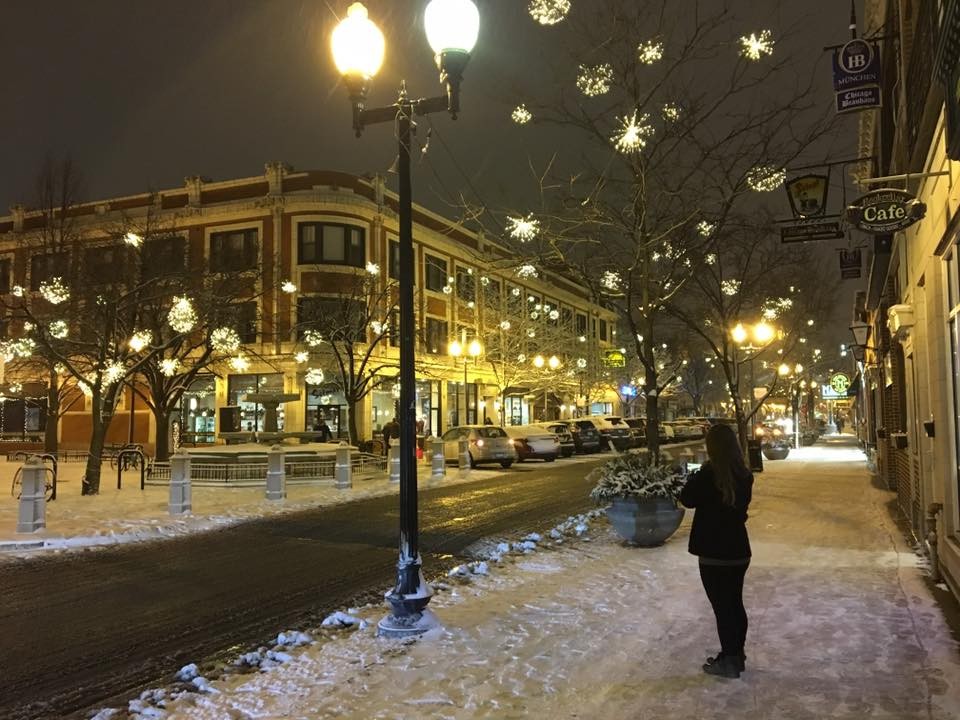 Suzy’s greatest challenge as an owner, after the first couple years, was the pandemic that curtailed her business. Revenue from in-store sales and off-site author events all but disappeared overnight, and necessitated a sudden switch to online selling and virtual programming. Jim rallied supporters with his Inside for Indies video series that raised money to get stores like The Book Cellar through a very rough patch. Customers adapted to a new, if only temporary, buying model.
Suzy’s greatest challenge as an owner, after the first couple years, was the pandemic that curtailed her business. Revenue from in-store sales and off-site author events all but disappeared overnight, and necessitated a sudden switch to online selling and virtual programming. Jim rallied supporters with his Inside for Indies video series that raised money to get stores like The Book Cellar through a very rough patch. Customers adapted to a new, if only temporary, buying model.
“Making it through the hardest times was all because of the will of the neighbors, the support of the shoppers,” said Suzy. “Being a small business owner is seven days a week. It’s always with you, always on your mind, you’re always troubleshooting. I thought, when I opened the store, I’d be retiring. I didn’t think it would be such a time commitment, but it is.”
Still, Suzy relishes the life she built for herself and the community of which she’s become a vital part. Reality challenged but did not defeat her loftiest dreams, in which wine and books would fall under the guise of work. “A hundred percent, that’s my MO,” said Suzy. “All reading and drinking. I’m working, honey.”
Donald G. Evans is the author of a novel and story collection, as well as the editor of two anthologies of Chicago literature, most recently Wherever I’m At: An Anthology of Chicago Poetry. He is the Founding Executive Director of the Chicago Literary Hall of Fame.


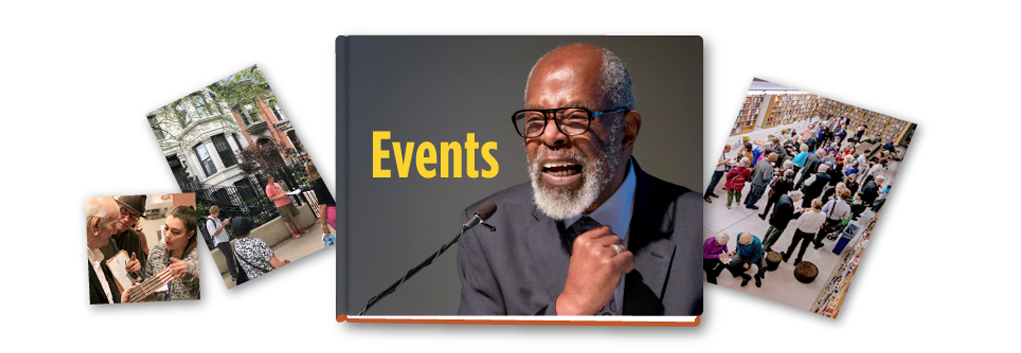
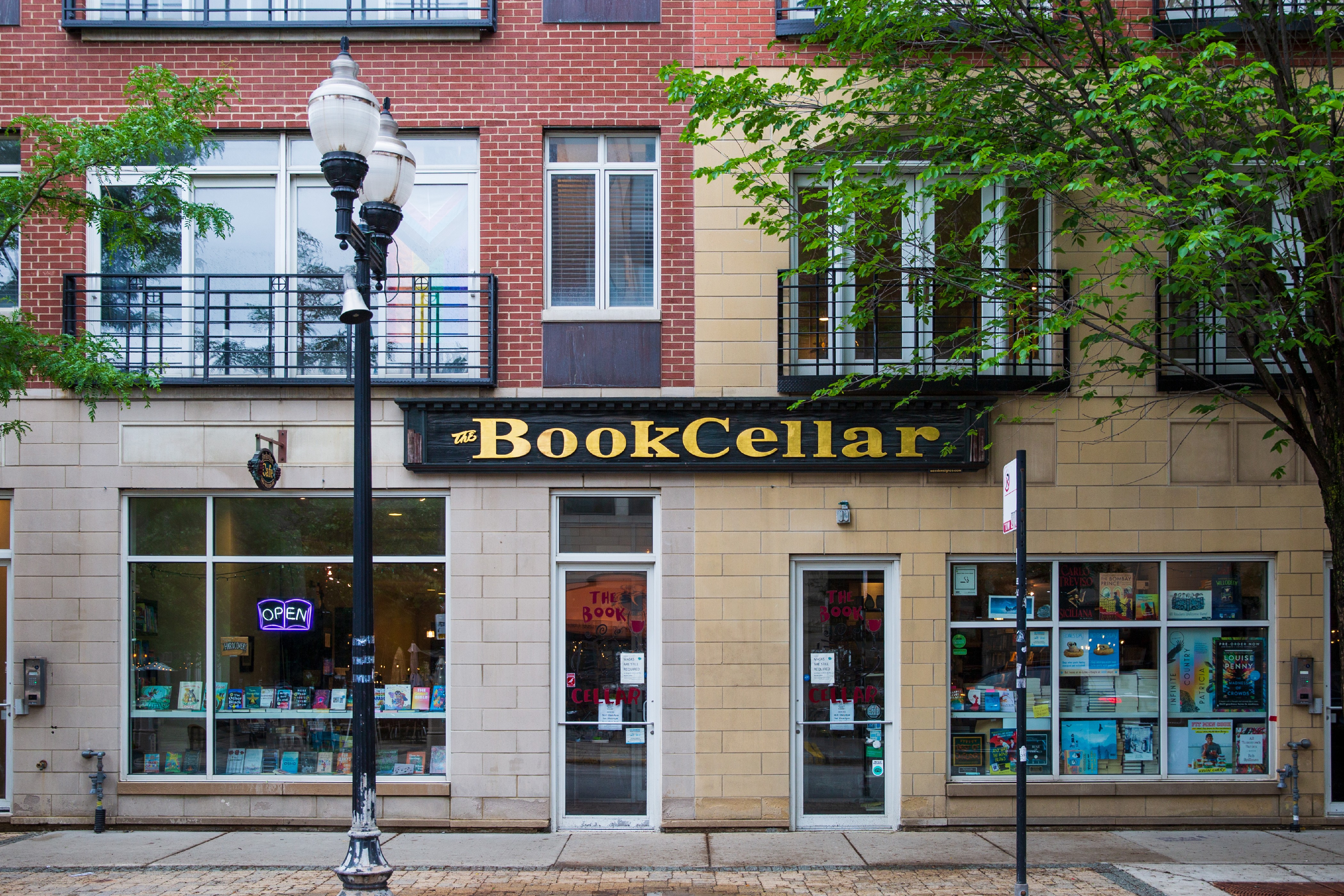
.JPG)





